RECENTLY ATTENDED SCARFACE AT AERO THEATRE, STUNNED TO WATCH HIS OWN COMMITMENT TO THE ROLE
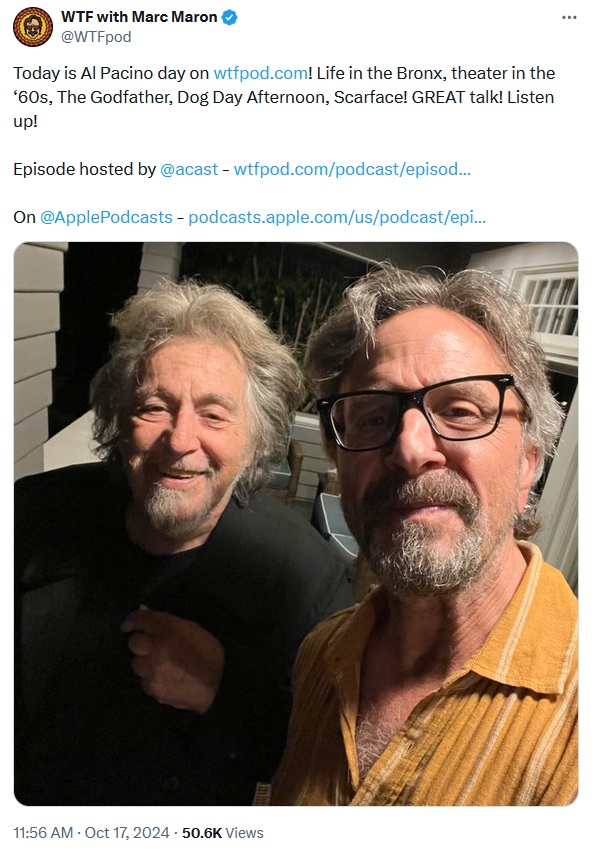
Updated: Tuesday, October 22, 2024 11:54 PM CDT
Post Comment | Permalink | Share This Post
 Hello and welcome to the unofficial Brian De Palma website. Here is the latest news: |
|---|
E-mail
Geoffsongs@aol.com
-------------
Recent Headlines
a la Mod:
Listen to
Donaggio's full score
for Domino online
De Palma/Lehman
rapport at work
in Snakes
De Palma/Lehman
next novel is Terry
De Palma developing
Catch And Kill,
"a horror movie
based on real things
that have happened
in the news"
Supercut video
of De Palma's films
edited by Carl Rodrigue
Washington Post
review of Keesey book
-------------
Exclusive Passion
Interviews:
Brian De Palma
Karoline Herfurth
Leila Rozario
------------
------------
| « | October 2024 | » | ||||
| S | M | T | W | T | F | S |
| 1 | 2 | 3 | 4 | 5 | ||
| 6 | 7 | 8 | 9 | 10 | 11 | 12 |
| 13 | 14 | 15 | 16 | 17 | 18 | 19 |
| 20 | 21 | 22 | 23 | 24 | 25 | 26 |
| 27 | 28 | 29 | 30 | 31 | ||
De Palma interviewed
in Paris 2002
De Palma discusses
The Black Dahlia 2006

Enthusiasms...
Alfred Hitchcock
The Master Of Suspense
Sergio Leone
and the Infield
Fly Rule
The Filmmaker Who
Came In From The Cold
Jim Emerson on
Greetings & Hi, Mom!
Scarface: Make Way
For The Bad Guy
Deborah Shelton
Official Web Site
Welcome to the
Offices of Death Records

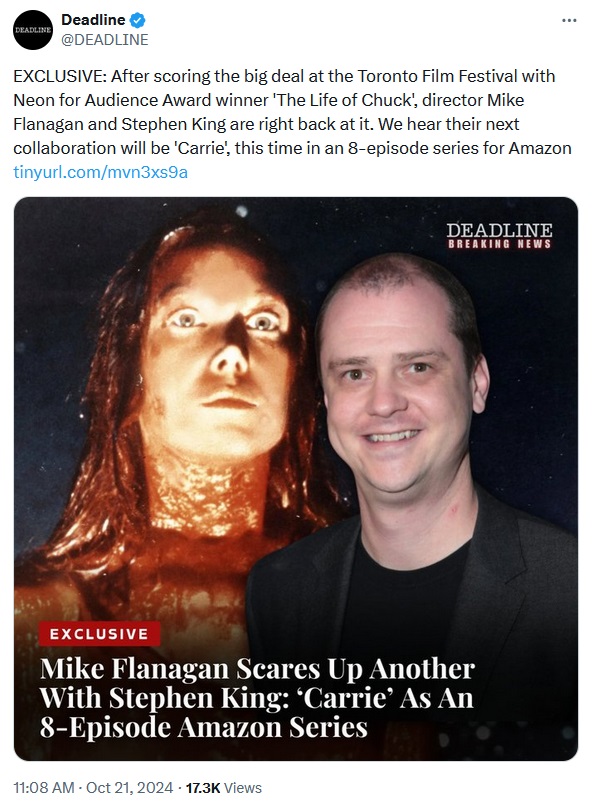
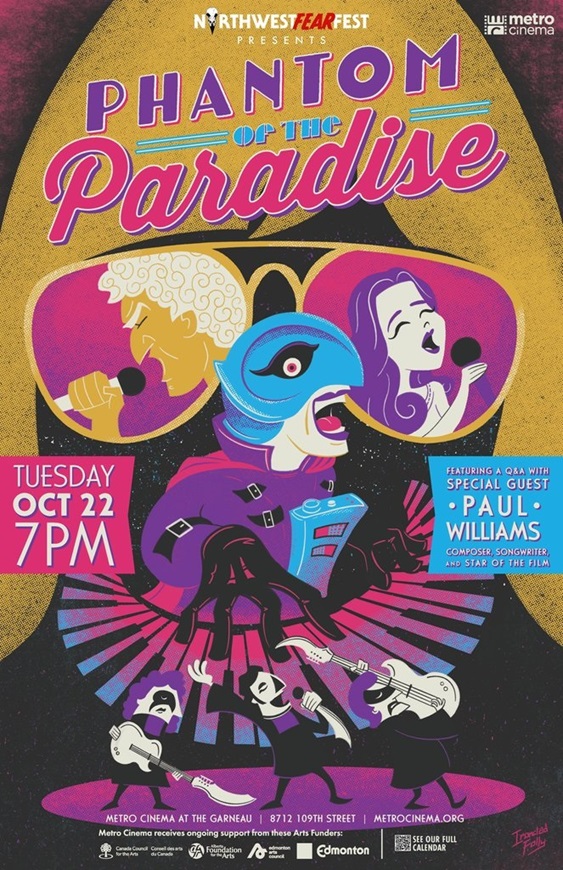
Here's Griwkowsky's intro to the Edmonton Journal article:
Living a life of unparalleled collaboration, Paul Williams is surely the only person on Earth able to claim a direct creative pipeline to David Bowie, Barbra Streisand/Kris Kristofferson and Kermit the Frog, all of whom sang his lyrics to the world — including Hunky Dory’s Fill Your Heart, A Star Is Born’s Grammy-winning Evergreen, and the immortal Muppet Movie opening theme, Rainbow Connection.Remarkably, it’s just the tip of Williams’ creative iceberg.
His staggeringly diverse accolades stretch back to a different Grammy win with Daft Punk in 2014, singing with a lit cigarette in full Battle for the Planet of the Apes makeup on Johnny Carson in ’73, co-writing We’ve Only Just Begun and Rainy Days and Mondays for The Carpenters — never mind penning the words to The Love Boat theme!
Insanely, the list goes on, including voicing the beloved Batman Animated Series’ Penguin amid countless guest spots on everything from Babylon 5 to The Hardy Boys, occupying a Hollywood Square in the midst of it all.
To try and zoom in like that helicopter shot into Kermit’s swamp, the 84-year-old legend is here Tuesday at Metro Cinema for NorthwestFEARFest’s closing–night, 50th-anniversary screening of Brian De Palma’s beautifully weird and musically wondrous cult classic Phantom of the Paradise, scored by and indeed starring Williams.
In a long and magnificent conversation I can just barely sample here, the Oscar/Grammy/Golden Globe-winner talks about it all, laughing as he asks to flip from the phone over to Zoom, “I’m so f—ing old, I listened to everything at 11 for 40 years!”
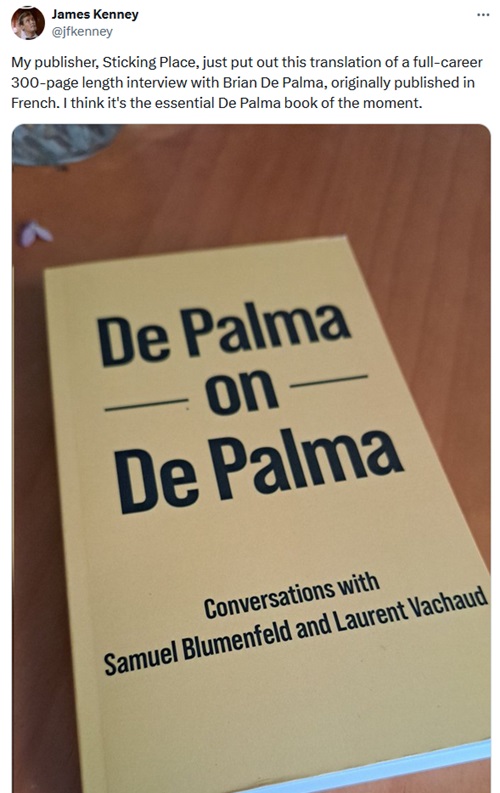

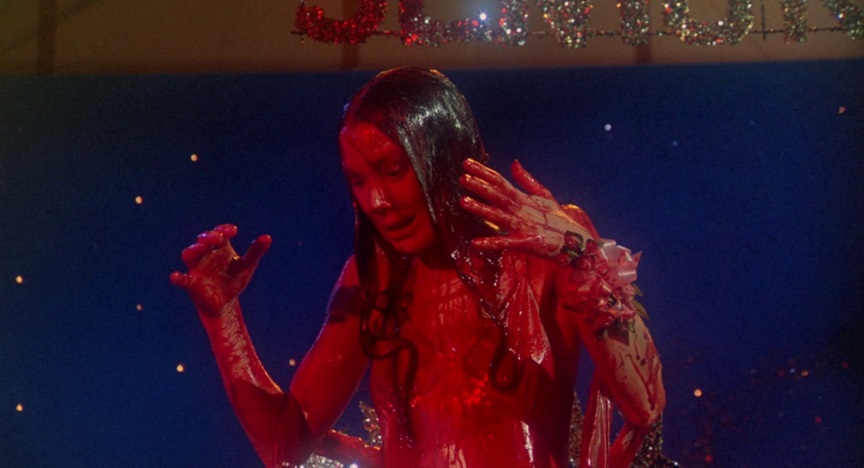
So much of Carrie now looks, 48 years on, unsubtle to say the least – and yet De Palma is a master of making that lack of subtlety work cinematically. The frankly outrageous soft-porn aesthetic of the initial girls’ locker room scene gives us Spacek almost languorously soaping herself in the shower, in a way that is madly inconsistent with her character. And yet without that absurdly provocative sequence, the “period” moment wouldn’t have been so transgressive, so nasty, so tactless. This is crass, this is the male gaze, sure – and yet it is subverted by its casually explicit violence and vulnerability. It’s impossible to feel anything other than genuine protective concern for a female character who is later to show that she doesn’t need anyone’s protection.And that staggering, drawn-out prom sequence, in which Carrie evolves from ugly duckling to swan to something else entirely – its meaning and atmosphere changes on a subsequent viewing. The first time you watch it, the denouement is a shock, despite the fact that in previous scenes you’ve seen the nasty planning that has gone into it. But the second time, the scene is, end to end, an unbearable ordeal of pure evil: minute after minute goes by while Carrie progressively relaxes and begins to enjoy herself with the wonderful boy who’s taken her on this date. And then, when she unleashes her gonzo uproar of telekinetic rage, De Palma fragments the spectacle with a split-screen: a crazy death metal of carnage.
Carrie is about all the things it didn’t know it was about: internalised misogyny and self-hate, and the theatre of cruelty involved in high school popularity. It isn’t explicitly about school shootings and yet it shows you, like no other film I have ever seen, the horrifying wish-fulfilment ecstasy of such horrific acts. De Palma is the only director who could have done it.

Speaking to Noah Baumbach in the 2015 documentary about his career, De Palma recalls, “I had carte blanche to make this movie, and it was all great until they saw it.” “Body Double” was made in the fallout of financial failures and frustration, cashing in on the recent success of “Scarface” to make an impossible “how did this get made” miracle of a pervert cinema. After years of feeling chewed out by Hollywood, De Palma channeled the anti-establishment anger of his earlier political documentaries into a psychosexual autocritique of himself and his career, as well as a bracing satire of show business and the ghouls inside it. Or, as crime novelist Megan Abbott wrote, “His movies thus become conspicuous, gaudy spectacles of male anxiety and lust, orgies of panicked masculinity in the face of the powerful female.”“Body Double” is the ultimate expression of that theme. Over the last decade, De Palma had a rough run: “Carrie” was a hit, but the Travolta-starring “Blow Out” (a masterwork of paranoia) cost more than “Star Wars” and flopped. He’d just finished a fraught battle with the MPAA over the rating on “Scarface,” and was licking his wounds from a tough divorce with Nancy Allen, his creative muse since “Carrie.”
It was under that industry heat that “Body Double” was born, daring not only to remake one Hitchcock classic but two: a twisted double-bill of “Rear Window” and “Vertigo,” reconceptualized through the pop-kitsch prism of MTV and the lubed backrooms of 1980s hardcore porn. Take the opening scene, with De Palma’s camera panning through an imitation graveyard, tilting into an underground coffin to reveal a bleach-blonde vampire, collared in the couture of S&M. He’s staring at the camera, at us, and we quickly realize something is wrong: a frozen fourth wall break, his fangs and crimson lipstick are unable to move. And then we hear, “Action, Jake. Jake, action…okay cut!” and see a bustling film set.
We were watching Jake Scully (Craig Wasson), a struggling actor. He, like “Scottie” in “Vertigo,” has a crippling psychological flaw. Instead of a dolly-zoomed fear of heights, Jake suffers from debilitating claustrophobia, and he discovers it while shooting the low-rent horror flick “Vampire’s Kiss,” risking ruin to his career. The director tells him to take the rest of the day off, a smiling backstab to fire Jake from the horror picture–the first sign of De Palma’s festering anger towards Hollywood.
This beginning sequence is a fever-dreamed meta-commentary not only on the rest of the movie but the nature of cine-artifice itself. It also recalls the opening of “Blow Out,” another De Palma picture that begins with a film within a film, both movies tricking us into the illusion we’re watching low-grade horror pictures, satirical jabs at the kind of movies De Palma was accused of making. More importantly, they show a sudden branching of one cinematic world penetrating another, an idea reinforced again and again through “Body Double.” This includes even the title card, first revealing a western horizon, only to be then exposed as a matte painting wheeled away into the studio backlot. Should this matte backdrop seem any less “real” because, diegetically, we were shown it was fake when it isn’t any more or less illusory and authentic than when we first saw it? The riddle of suspension of disbelief is a tricky thing, and “Body Double” is a feature-long play on the idea, driving into a climax that turns these tricks into entire setpieces and structural games.

He wrote: “I’ve only recently learned that the perception in the industry was that I snubbed the Oscars – that I didn’t attend the ceremony because I was nominated for The Godfather as a supporting actor and not as a leading man. That somehow I felt slighted because I thought I deserved to be nominated in the same category as Marlon.
“Can you imagine that was a rumour that exploded at the time, and I only found out about it recently, all these years later? It explains a lot of the distance I felt when I came out to Hollywood to visit and to work. It was appalling to learn it now, having missed all these opportunities to deny it, not even knowing that this is what people thought of me. “
The Academy would soon forgive Pacino, nominating him for Serpico, The Godfather Part II, Dog Day Afternoon, And Justice for All, Dick Tracy, Glengarry Glen Ross, Scent of a Woman – for which he won – and The Irishman.
However, Pacino thinks Scarface should be on that list. While promoting the memoir on the Today programme, the actor, who played Tony Montana in Brian De Palma’s 1983 film, said: “I would have liked to have even got nominated for that one.”
Scarface was a huge critical flop at the time of release, with Pacino writing in the memoir: “Sometimes an audience doesn’t know exactly what it’s seeing right away, and they need time to take it in and absorb it.”
He added: “Scarface got no attention from the Academy Awards. I cannot overstate the unbelievable job Brian De Palma did on Scarface, mapping the film and charging it with such dynamism and reach. He took it to the limit. Why he wasn’t honoured for it will forever make me wonder.”
"Scarface" - I just recently went to the Aero Theatre because they were having a showing of it there, and they wanted me to talk. So I talked a little - I was overwhelmed when I saw it. I hadn't seen it for years. And so when I went there and saw this film on this big screen and the people who - most of the people weren't even born when "Scarface" came out. You know, Brian De Palma wanted to make it like an opera. He says that's...SHAPIRO: Over the top, operatic. Yeah.
PACINO: Yeah. That was his intent, so that somehow - and the color in there and John Alonzo's cinematography. So it was quite a film.


This was De Palma’s Godard era, shortly before he pledged allegiance to Alfred Hitchcock. But as is the case with the director’s homages, however explicit, they still feel filtered through his singular sensibility. Despite its blackout sketch structure and improv comedy hijinks, Hi Mom! is unmistakably a Brian De Palma picture: endlessly self-reflexive, obsessed with ways of watching and being watched, always implicating the audience in the action with a wicked cackle. It’s basically the same story as Body Double, chronicling a young peeping Tom’s pet perversions while playfully reminding us that cinema itself is founded on similar predilections.Rubin’s obsession with capturing “a private moment” on camera has followed him home from Vietnam. He talks a cut-rate pornographer (the hilarious Allen Garfield) into financing his dream project. Rubin has rented a crummy tenement across the street from high-rise apartment building, and spends his days pointing a camera into the windows of his neighbors. The first in a career full of nods to Hitchcock’s Rear Window, Hi, Mom! takes Jimmy Stewart’s nosiness one step further as De Niro attempts to insert himself into the narrative. Rubin comes up with a convoluted means of seducing a single gal across the way (Jennifer Salt) and turning his own residence into a Rube Goldberg camera setup so that he can film himself having sex with her in her apartment.
Such an endeavor requires extremely precise timing, with a wrench thrown into the works when she’s hot to trot the moment he walks in. It’s odd that De Niro’s late-career pivot to comedy was greeted as such a surprise given the slapstick shenanigans of these early De Palma pictures. In Hi, Mom! he tries on a whole bunch of silly accents, making great hay out of a high-pitched affectation that Rubin seems to think connotes being “cultured.” (For years my friends and I tried to mimic the high dudgeon with which De Niro exclaims, “I’ll be damned!”)
The movie’s most notorious sequence comes when Rubin joins a radical African-American theater troupe, playing a police officer in a production called “Be Black Baby.” The avant-garde performance art piece lures members of the moneyed Manhattan elite downtown, where they’re painted in blackface and horrifically abused by the Black actors – who are all wearing whiteface makeup and screaming racist slurs. The theatregoers are robbed, beaten and sexually assaulted until a cop (De Niro) interrupts, refusing to believe any of the battered audience members and only listening to the actors wearing whiteface. The sicko punchline to the sequence finds these upper crust liberals all raving about the experience afterwards, discussing how much they’ve learned about oppression and now they really understand how it feels to be Black.
Hi, Mom! was out of official circulation for many years, and I remember a friend finally tracking down a VHS copy when we were in college. That night, we all stared at the screen in slackjawed awe at “Be Black Baby.” Watching it today, it’s still difficult to believe what you’re watching. The sequence is supposed to be part of a documentary on the film’s PBS parody, National Intellectual Television. (My favorite throwaway gag is that NIT’s sister radio station has a show called “Music To Write Checks By.”) But somewhere along the line, De Palma abandons the mockumentary gambit and plunges us directly into the dislocation and horror of what’s happening. By the time he pulls back for the punchline, the laughs can’t help but stick in your throat. It’s one of the most audacious things I’ve ever seen.